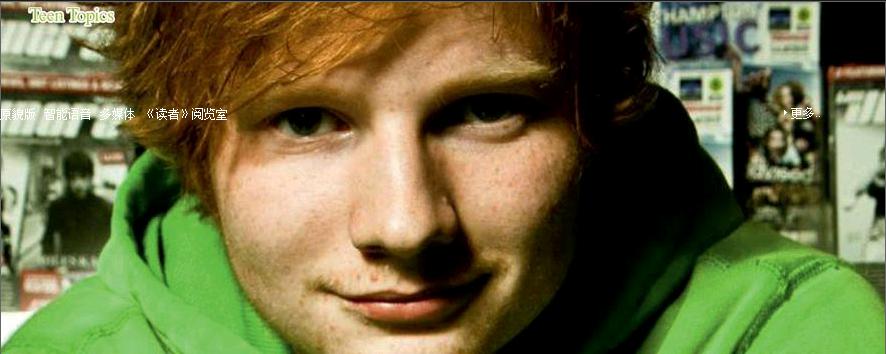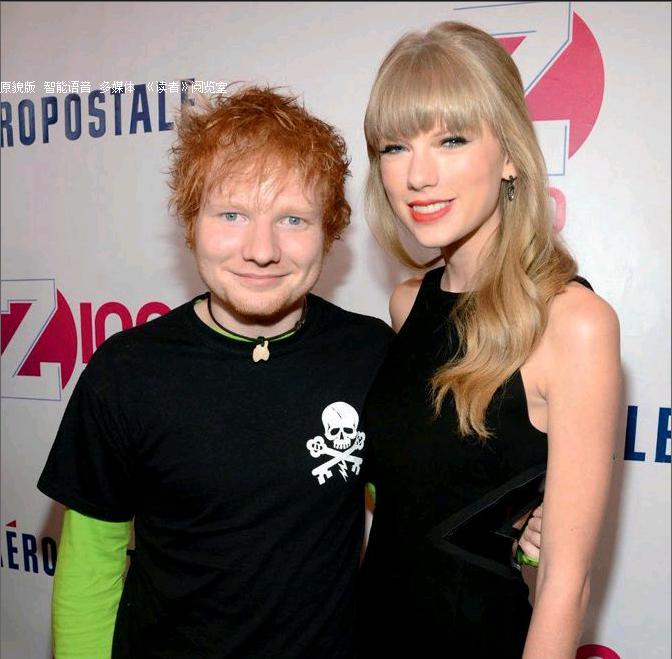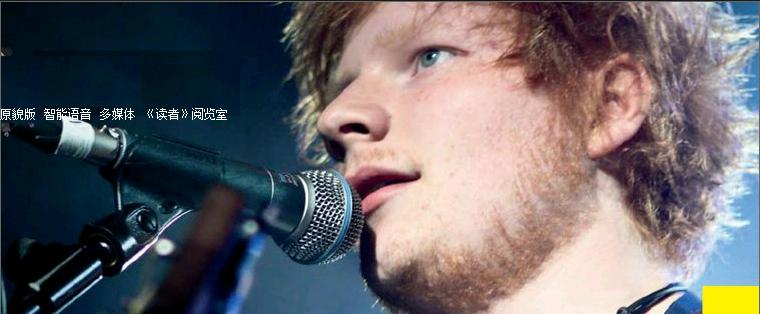艾德·希兰:天生我材必有用
2014-03-12ByDanaMarieKrook
By+Dana+Marie+Krook



Ed Sheeran's song, "You Need Me, I Don't Need You", spouts1) the lyric, "See, I'm true; my songs are where my heart is." But for Ed, it's not just a lyric; it's the truth.
While other artists may immediately step out into the middle of the stage looking for that spotlight to hit them, Ed is the type of musician content with letting his music fill the room with its powerful melody and message, while he's tucked2) in the corner, out of sight, living in the moment. "I think if I was trying to get a record deal and trying to get noticed, I would have got discouraged, but I was just kind of playing anywhere and everywhere," he says about first starting out. "I was trying to become the best I could be as a live performer. It was all about experience."
His album + has already been a huge success, going four times platinum3) in the UK and gold in Canada. With singles like "The A Team", "You Need Me, I Don't Need You", and "Lego House", Ed has won over the hearts of fans all over the world. Even those who seemed to have eyes only for4) fellow UK residents One Direction took notice when he appeared in their album credits5) for the song "Moments". He also worked with Taylor Swift, co-writing a song for her record earlier this year, after learning that she had been a fan for some time. And he had the world's attention on stage at the closing ceremonies for the 2012 Olympic Games in London when he performed Pink Floyd's6) "Wish You Were Here".
In order to fully appreciate his present successes—and what are sure to be future achievements—you have to take a look back at where it all started.
Ed Sheeran grew up in Suffolk, which is a mostly rural area to the northeast of London. He first picked up a guitar around age 11 and learned to beat box7) by imitating YouTube videos. Then, at 16, he decided to drop out of school and move to London on his own to pursue his dreams of becoming a musician. "It was the choice between staying in school, going to university and trying to get a job, or dropping out and seeing if the music thing would work," Ed says. "From the age of 16, I had to take it very seriously because it was the only thing that I was doing at that time."
Preferring an educational route of trial and error, Ed set out to produce his own music, sell independent EPs8) and book his own gigs9)—all "without any money or any contacts". He looked to British musician James Morrison10) as an inspiration of someone who earned his success one show at a time. "He played loads of shows; that's how it worked for him," Ed says.
Exceeding the number of shows his role model racked up11), at one point, Ed had performed over 300 shows in one year alone. But his risky move paid off12). "I think people work well under pressure," he says, thinking about his decision to go in13), all or nothing. "I didn't have confidence, but you work on that and get more confident as it goes on."
While signing a record deal was a major accomplishment for Ed, it wasn't his main goal during his early days. "My main kind of focus wasn't to become a worldwide superstar; it was just to get my music [out there] and build a fan base."
And that's exactly what he did. Before his commercial success, Ed released an EP called No. 5 Collaborations Project which included his work with some underground UK rappers. Without radio play, television promotion or a label14), the EP shot to number two on iTunes. "That was the time where I realized that the fan base was quite extensive," says Ed.
It was only a few months after the release of that EP that Ed found himself signing with Atlantic Records. His first single, capturing him even more attention, was "The A Team"—a ballad15) with a dark and powerful message about the cyclical nature of drug addiction. "I did a gig in a homeless shelter. It was written about one of the women that I met there: her journey and her story," says Ed. "I was 18 at the time. I had only lived in London for two years, so I had never seen the dark underbelly16) of it and obviously there are quite dark, disturbing elements to every major city, and I witnessed quite a few of them that day."
Now, his first full album + has been out for a while, yet Ed maintains that its success hasn't added to the pressure he feels to continue making great music and touring the world. "It puts more pressure on my label," he says. "I'm good because I know I'm always going to make music."
But he is looking to constantly improve his art, and a part of that is increasing the number of people who are exposed to it. "I look at other musicians that are in the same vein17) as me and wonder why I'm not doing as well and work to do as well. My benchmark18) at the moment is someone like Adele19), who is just a phenomenon," Ed says. "If I didn't sell as many records as Adele, I'm not going to cry about it, but if I sell half as many, I'll be happy."
Though he still looks up to other musicians as role models, Ed is now a source of inspiration for millions. Yet, despite his fame, Ed still remains true to himself: singing his truth through music and living in the moment, appreciating every part of the process.
During his show in Toronto, at the beginning of his first headlining20) tour in Canada, he couldn't get over21) the size of the crowd that had gathered to watch him play. He repeated his humble gratitude many times throughout the night to responses of screaming and then complete silence as his fans quieted down to soak up the slower ballads.
"It's quite a shock to adjust to having people looking up to you," Ed says. "The most important thing to do in any situation is to be yourself. No one can do you better than you, so be happy about it and realize that you're individually important."
艾德·希兰的歌曲《你需要我,我不需要你》中重复着这样一句歌词:“瞧,我很真诚,我的歌声就是我的心声。”但对艾德来说,这不只是一句歌词,更是他信奉的真理。
其他的歌手可能会迅速走到舞台中央,追寻着打在他们身上的聚光灯,而艾德却愿意任由他那旋律动听、歌词动人的音乐充满整个场地,自己则躲在无人注意的角落,陶醉在当下——他就是这样的音乐人。谈到最初的演唱生涯,艾德说:“我觉得如果我当时只是努力想得到一份签约,只想着要引人注目,我恐怕早就泄气了。可我那时就只是四处去唱歌,每次都尽力发挥出自己现场表演的最佳水平,就想积累经验。”
艾德的专辑《+》已经大获成功,在英国的销量突破120万张(编注:此为2012年本文发表时的数据),在加拿大的销量也达到了四万张。凭借《一流货色》《你需要我,我不需要你》和《积木房子》等单曲,艾德赢得了世界各地歌迷们的喜爱。当艾德因参与《时时刻刻》这首歌的创作而出现在单向乐队专辑的创作人员名单中时,就连那些眼里似乎只有单向乐队的歌迷也注意到了艾德——单向乐队与他同为英国本土歌手。艾德还与泰勒·斯威夫特合作过,在他得知斯威夫特曾经有段时间是他的粉丝之后,他于今年年初(编注:指2012年)与斯威夫特合作为她的专辑写了一首歌(编注:指斯威夫特专辑《Red》中“Everything Has Changed”这首歌)。2012年伦敦奥运会闭幕式上,艾德献上了一曲平克·弗洛伊德乐队的《愿你在此》,令世界瞩目。
为了全面认识艾德目前的成功以及他将来必会迎来的更大成就,我们很有必要回顾一下他的成名之路。
艾德·希兰在位于伦敦东北边的萨福克郡长大,那里的大部分地方都是乡村。大约11岁时,艾德第一次拿起吉他,并开始跟着YouTube网站上的视频模仿学习嘻哈音乐中的口技。之后在16岁那年,艾德决定退学,只身前往伦敦追逐他的音乐梦。“当时我有两个选择:要么继续读书,考上大学,然后找份工作;要么退学去唱歌,看看音乐这条路是否走得通,”艾德说,“从16岁起,我就不得不非常认真地对待唱歌这件事,因为这是我当时唯一在做的事情。”
艾德更倾向于选择“不断尝试,不怕犯错”的成长路线,于是开始创作自己的音乐,出售个人录制的迷你专辑,并预约自己的演唱会——所有这些“没赚到一分钱,也没任何人联系他”。艾德将凭借一场场演唱最终获得成功的英国歌手詹姆斯·莫里森视为自己的励志偶像。“他唱过很多很多场,就这样唱出了名头。”艾德说。
艾德一度在仅仅一年内(编注:指2009年)就唱了三百多场,这一数值已经超过他的榜样詹姆斯·莫里森的全部演唱场数。不过艾德的这一冒险举动最终有了回报。“我觉得人在压力下会做得更好,”忆起当初决定孤注一掷搏一回时,艾德说,“我当时并没有信心,但如果你努力去做这件事,随着事情的进展,你就会越来越有信心。”
尽管对艾德来说,签约唱片公司是一项重大成就,但这并不是他早期的主要目标。“我那时的主要奋斗目标不是成为一名国际巨星,而是让世人听到我的歌声,建立起自己的粉丝群。”
艾德确实是这么做的。在获得商业成功之前,艾德曾发布过一张名为《第五合作项目》的迷你专辑,其中收录了他与英国一些地下说唱歌手合作的曲目。这张专辑没有借助电台播放、电视宣传或唱片公司就一跃成为苹果在线商店热门专辑第二名。“那时我才知道,我的粉丝群已经相当庞大了。”艾德说。
这张专辑推出没几个月,艾德就正式签约了大西洋唱片公司。他的首支单曲《一流货色》让他更加备受瞩目。这首流行抒情歌曲讲述了吸毒成瘾带来的恶性循环,内容阴暗而又撼动人心。“我曾经在一个收容所做过一次演出,这首歌写的是我在那里遇到的其中一个女人的经历和故事,”艾德说,“当时我18岁,在伦敦才待了两年,还从未见过这个城市阴暗的一面。很显然,每一座大城市都有阴暗、丑陋的方面,那天我就亲眼目睹了不少。”
如今,艾德的首张正式专辑《+》已经问世多日,不过艾德一再表示,尽管他为了继续创作优秀音乐及进行世界巡回演出感到了一些压力,但这张专辑的成功并未让他觉得压力加重。“我的唱片公司倒是因此压力倍增,”艾德说,“我还好,因为我知道我会一直不停地创作音乐。”
不过,艾德目前正在不断努力把自己的音乐做得更好,其中一个任务就是让更多的人听到他的音乐。“我会参照跟我风格相同的其他歌手,琢磨为什么我做得没有他们好,然后努力赶上去。我目前的参照标准是像阿黛尔这样的人,她简直就是一个奇迹,”艾德说,“要是我的唱片卖得没阿黛尔多,我不会伤心落泪;但我的唱片若能卖到她唱片的一半,我就会很开心。”
虽然艾德仍旧把其他歌手当榜样,但他自己现在也已是百万大众的励志偶像。不过,尽管他名气不小,他仍然保持着本真:用音乐歌唱自己信奉的真理,活在当下,享受每个过程。
在加拿大多伦多,艾德举办了他的第一场备受关注的个人巡演,前来观看他演出的观众规模让他感到震惊。整个晚上,歌迷们不时发出一阵尖叫,继而又因安静下来沉浸于他那舒缓的歌声中而变得悄然无声,对于歌迷的这些反应,艾德多次谦恭地表达了自己的谢意。
“突然要习惯被人崇拜,让我十分震惊,”艾德说,“不管在什么情况下,最重要的是要做好自己。没有人会比你更擅长做你自己,因此要对这样的事实感到欣喜,也要明白你作为一个个体很重要。”
1. spout [spa?t] vt. <口>滔滔不绝地讲;喋喋不休地说
2. tuck [t?k] vt. 把……藏入
3. platinum [?pl?t?n?m] adj. 白金唱片奖的。唱片销量在美国超过100万张为白金唱片,在英国超过30万张为白金唱片,在加拿大超过八万张为白金唱片,超过四万张为金唱片。
4. have eyes only for: 仅对……感兴趣
5. credit [?kred?t] n. [常作~s] (电影或电视等的)片头(或片尾)字幕,摄制人员名单
6. Pink Floyd: 指英国摇滚乐队平克·弗洛伊德,于1965年成立,秉承迷幻摇滚(Psychedelic Rock)和前卫摇滚(Progressive Rock)风格,是流行音乐史上从商业角度最为成功的乐队之一,有极大的影响力。
7. beat box: 指用嘴唇、牙齿、舌头、口腔和喉咙来模仿鼓声、打出节奏、发出曲调的一种新型艺术,是口技的一种形式,通常与嘻哈音乐(hip-hop)文化息息相关,是嘻哈音乐的重要元素之一。
8. EP: (= Extended Play)以前指慢速唱片,现在指容量介于单曲专辑和大专辑之间的迷你专辑,一般每张包含4~5首歌。
9. gig [ɡ?ɡ] n. (爵士乐队、摇滚乐队、独奏或独唱演员等的)特约演奏
10. James Morrison: 詹姆斯·莫里森(1984~),英国歌手,经过多年演唱其他歌手歌曲的生涯后最终成名,2007年获得全英音乐奖最佳男歌手奖。
11. rack up: <俚>累积取得
12. pay off: <口>赢利;得到好结果;取得成功
13. go in: 参与
14. label [?le?bl] n. 唱片公司
15. ballad [?b?l?d] n. (节奏缓慢的)流行抒情歌曲;情歌
16. underbelly [??nd?beli] n. 薄弱部分,弱点
17. in the same vein: (说话或写作)风格相同的
18. benchmark [?bent?mɑ?k] n. 基准,基准尺度
19. Adele: 阿黛尔(1988~),英国著名女歌手,荣获音乐奖项无数,包括八项格莱美奖。其于2011年发行的第二张专辑《21》在全球销量已超过2600万张。
20. headline [?hedla?n] vi. 成为注意中心;当主角
21. couldn't get over: 震惊于,因……极为惊讶
译 / 两袖清风
